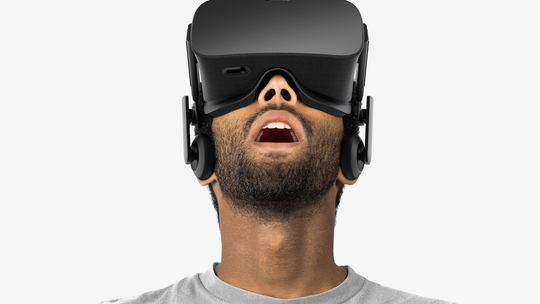
Since the early days of CES, virtual reality demos have been a mainstay of the tech showcase.
But it looks 2016 is shaping up to be the year virtual reality goes beyond the showroom floor and into, well, actual reality.
The Oculus Rift begins preorders January 6, HTC and Valve are set to debut Vive in April, while Samsung Gear VR and Google Cardboard are already in consumers' hands. Now with CES 2016 about to kick off, we're about to get a better look at what may finally be the technology's breakout year.
It's been a long time coming, said former Oculus lead scientist and current professor at University of Illinois Urbana-Champaign Steve LaValle. He took a break from teaching back in 2012 to work on Oculus, and returned to UIUC in 2014. LaValle later headed up a virtual reality course at the university.
He said people have been touting the breakthrough year for VR since he started at Oculus, but this year the fact that the main players are set to get hardware into peoples' hands is promising for the nascent industry. With that in mind, here's what LaValle suggests to keep an eye on at CES and beyond as virtual reality kicks off what could be its biggest year yet.
It's about more than just the headset.
The VR experience happens inside the headset, but it also happens in the real world where there are objects to bump into and people are used to moving more than just their head. That's why LaValle suggests that the most successful VR leaders will be the ones make VR functional and flexible. "Good headset design has kind of been figured out. There's some optical issues, everyone can figure out its important to have a high density screen, a high refresh rate," he said. "Once you get beyond that, differentiators will be content and what type of interface or control you have."
For example, HTC just announced Vive Pre, which is a version of the Vive with a front-facing camera that shows a black-and-teal rendering of the real world if a user steps outside their boundaries. Later this year Oculus will add Oculus Touch, a set of two controllers, to its lineup. There are also a number of startups, such as Nod Labs and Leap Motion working on controllers, and Magic Leap working on augmented reality tech (with heavy Google backing), so keep an eye out for tech that goes beyond goggles that can make an experience that much more dynamic.
Content is going to be key, but it's not there yet.
Five to ten years out we'll be laughing at the quality of what we have now
"One of the biggest limitations is what is VR good for? What kind of content? What kind of people are going to be using it?" said LaValle. "And I think that whole ecosystem is continuing to grow and it's finally crossing some critical threshold where people can sit and play with these devices for longer than a quick two minute demo."
Gaming is certainly the first area that will feel the effects of virtual reality. Beyond that, LaValle sees movies and media experiences adapting to VR. Recently the New York Times teamed up with virtual reality film startup VRSE to produce VR documentaries, and included a Google Cardboard device for viewing the films with their paper. LaValle also sees the improvement in mobile camera technology as key to this change--what if instead of uploading vacation photos to Facebook, you could upload a panoramic photo or video that people could step into through their VR headset?
One of the best experiences he's had so far has been with a simple Gear VR app that takes the user on a deep sea dive where they can interact with fish. The creator was conscious of small details, and the experience is "magical," LaValle said.
However, content is still light for VR devices, and that's partly because designing apps often requires knowledge beyond programming. "The human vision system is doing so much we aren't aware that is happening," he said.
The best is yet to come
As virtual reality makes its way to the mainstream, LaValle predicts the hardware is going to rapidly advance and app developers will discover uses for the headsets that we probably can't even conceive of yet. "Five to ten years out we'll be laughing at the quality of what we have now," he said.
With that in mind, he suggested that anyone curious about virtual reality should have an open mind when trying out devices. Be willing to go beyond a two minute demo and try apps that go beyond gaming. "Don't make too strong of an opinion when you haven't tried a variety of experiences," LaValle said.








